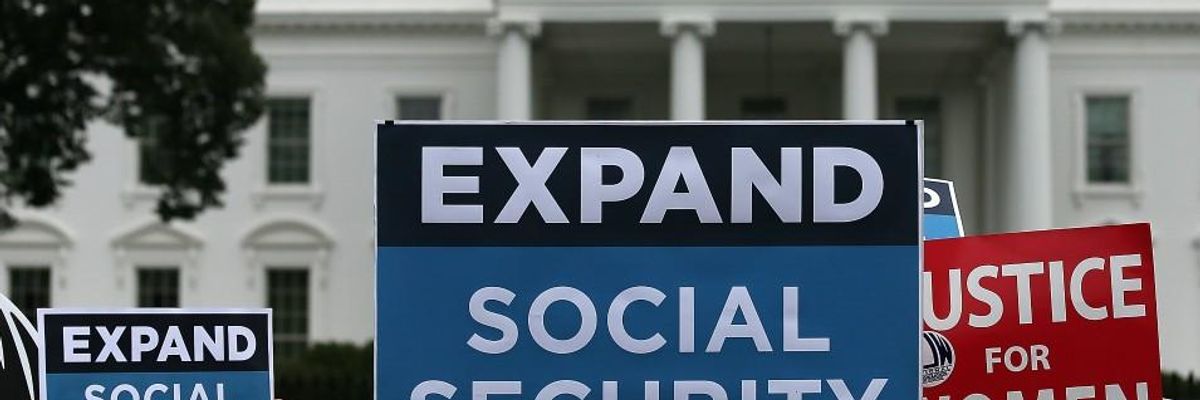
Activists participate in a rally calling for the expansion of Social Security benefits in front of the White House July 13, 2015 in Washington, D.C. (Photo: Win McNamee/Getty Images)
Millionaires Stop Paying Into Social Security for the Year Tomorrow, Highlighting Need to Scrap Payroll Tax Cap
"The burden of Social Security taxes falls more heavily on those who make less."
On Wednesday, not even two full months into 2020, millionaires will stop paying into Social Security for the year due to the program's payroll tax cap.
The cap limits annual wages subject to the Social Security payroll tax to the first $137,700. Sarah Rawlins, program associate at the Center for Economic and Policy Research (CEPR), wrote Tuesday that the cap means "someone who makes $1,000,000 per year stops paying into the program on February 19, 2020."
"That makes a millionaire's effective tax rate well below the 6.2% of income that most Americans pay," Rawlins noted. "Instead, it is less than 1% of a millionaire's income. The Social Security tax is only levied on wages, excluding income from other sources like capital gains, meaning those with wages over the cap likely have an effective tax rate even lower than this estimate."
"The burden of Social Security taxes falls more heavily on those who make less," Rawlins added.
\u201cSocial Security payroll tax cap is put into sharp focus this time each year. That\u2019s when millionaires stop paying into #SocialSecurity for the year. Try CEPR\u2019s handy calculator to see when you or your favorite 1% stops paying.\nhttps://t.co/La3exUHB0i\u201d— CEPR (@CEPR) 1582048404
Rawlins suggested that one way to make the Social Security financing system more progressive is "scrapping the payroll tax cap entirely and making everyone pay the same tax rate."
"Social Security gives retirement, disability, and survivor benefits to almost 20 percent of the U.S. population, including at least six million children," Rawlins said. "But it could do better."
Rep. John Larson's (D-Conn.) Social Security 2100 Act, introduced in the House in January 2019 with 208 Democratic co-sponsors, would apply the payroll tax to wages above $400,000.
Sen. Bernie Sanders (I-Vt.), a 2020 Democratic presidential candidate, has proposed subjecting all income above $250,000 in order to "expand benefits across-the-board, including a $1,300 a year benefit increase for seniors with incomes of $16,000 a year or less."
As Common Dreams reported last December, an analysis by Boston College's Center for Retirement Research found that Social Security has become increasingly regressive in recent decades due to a number of factors, including soaring economic inequality.
"The program's become less progressive," said Jim Roosevelt, a former associate commissioner for retirement policy at the Social Security Administration and a grandson of former President Franklin Delano Roosevelt, who signed the Social Security Act into law in 1935.
"It doesn't take care of the people at the lower- and middle-income levels as well as it was intended do," Roosevelt said, "and it needs to be updated."
An Urgent Message From Our Co-Founder
Dear Common Dreams reader, The U.S. is on a fast track to authoritarianism like nothing I've ever seen. Meanwhile, corporate news outlets are utterly capitulating to Trump, twisting their coverage to avoid drawing his ire while lining up to stuff cash in his pockets. That's why I believe that Common Dreams is doing the best and most consequential reporting that we've ever done. Our small but mighty team is a progressive reporting powerhouse, covering the news every day that the corporate media never will. Our mission has always been simple: To inform. To inspire. And to ignite change for the common good. Now here's the key piece that I want all our readers to understand: None of this would be possible without your financial support. That's not just some fundraising cliche. It's the absolute and literal truth. We don't accept corporate advertising and never will. We don't have a paywall because we don't think people should be blocked from critical news based on their ability to pay. Everything we do is funded by the donations of readers like you. Will you donate now to help power the nonprofit, independent reporting of Common Dreams? Thank you for being a vital member of our community. Together, we can keep independent journalism alive when it’s needed most. - Craig Brown, Co-founder |
On Wednesday, not even two full months into 2020, millionaires will stop paying into Social Security for the year due to the program's payroll tax cap.
The cap limits annual wages subject to the Social Security payroll tax to the first $137,700. Sarah Rawlins, program associate at the Center for Economic and Policy Research (CEPR), wrote Tuesday that the cap means "someone who makes $1,000,000 per year stops paying into the program on February 19, 2020."
"That makes a millionaire's effective tax rate well below the 6.2% of income that most Americans pay," Rawlins noted. "Instead, it is less than 1% of a millionaire's income. The Social Security tax is only levied on wages, excluding income from other sources like capital gains, meaning those with wages over the cap likely have an effective tax rate even lower than this estimate."
"The burden of Social Security taxes falls more heavily on those who make less," Rawlins added.
\u201cSocial Security payroll tax cap is put into sharp focus this time each year. That\u2019s when millionaires stop paying into #SocialSecurity for the year. Try CEPR\u2019s handy calculator to see when you or your favorite 1% stops paying.\nhttps://t.co/La3exUHB0i\u201d— CEPR (@CEPR) 1582048404
Rawlins suggested that one way to make the Social Security financing system more progressive is "scrapping the payroll tax cap entirely and making everyone pay the same tax rate."
"Social Security gives retirement, disability, and survivor benefits to almost 20 percent of the U.S. population, including at least six million children," Rawlins said. "But it could do better."
Rep. John Larson's (D-Conn.) Social Security 2100 Act, introduced in the House in January 2019 with 208 Democratic co-sponsors, would apply the payroll tax to wages above $400,000.
Sen. Bernie Sanders (I-Vt.), a 2020 Democratic presidential candidate, has proposed subjecting all income above $250,000 in order to "expand benefits across-the-board, including a $1,300 a year benefit increase for seniors with incomes of $16,000 a year or less."
As Common Dreams reported last December, an analysis by Boston College's Center for Retirement Research found that Social Security has become increasingly regressive in recent decades due to a number of factors, including soaring economic inequality.
"The program's become less progressive," said Jim Roosevelt, a former associate commissioner for retirement policy at the Social Security Administration and a grandson of former President Franklin Delano Roosevelt, who signed the Social Security Act into law in 1935.
"It doesn't take care of the people at the lower- and middle-income levels as well as it was intended do," Roosevelt said, "and it needs to be updated."
On Wednesday, not even two full months into 2020, millionaires will stop paying into Social Security for the year due to the program's payroll tax cap.
The cap limits annual wages subject to the Social Security payroll tax to the first $137,700. Sarah Rawlins, program associate at the Center for Economic and Policy Research (CEPR), wrote Tuesday that the cap means "someone who makes $1,000,000 per year stops paying into the program on February 19, 2020."
"That makes a millionaire's effective tax rate well below the 6.2% of income that most Americans pay," Rawlins noted. "Instead, it is less than 1% of a millionaire's income. The Social Security tax is only levied on wages, excluding income from other sources like capital gains, meaning those with wages over the cap likely have an effective tax rate even lower than this estimate."
"The burden of Social Security taxes falls more heavily on those who make less," Rawlins added.
\u201cSocial Security payroll tax cap is put into sharp focus this time each year. That\u2019s when millionaires stop paying into #SocialSecurity for the year. Try CEPR\u2019s handy calculator to see when you or your favorite 1% stops paying.\nhttps://t.co/La3exUHB0i\u201d— CEPR (@CEPR) 1582048404
Rawlins suggested that one way to make the Social Security financing system more progressive is "scrapping the payroll tax cap entirely and making everyone pay the same tax rate."
"Social Security gives retirement, disability, and survivor benefits to almost 20 percent of the U.S. population, including at least six million children," Rawlins said. "But it could do better."
Rep. John Larson's (D-Conn.) Social Security 2100 Act, introduced in the House in January 2019 with 208 Democratic co-sponsors, would apply the payroll tax to wages above $400,000.
Sen. Bernie Sanders (I-Vt.), a 2020 Democratic presidential candidate, has proposed subjecting all income above $250,000 in order to "expand benefits across-the-board, including a $1,300 a year benefit increase for seniors with incomes of $16,000 a year or less."
As Common Dreams reported last December, an analysis by Boston College's Center for Retirement Research found that Social Security has become increasingly regressive in recent decades due to a number of factors, including soaring economic inequality.
"The program's become less progressive," said Jim Roosevelt, a former associate commissioner for retirement policy at the Social Security Administration and a grandson of former President Franklin Delano Roosevelt, who signed the Social Security Act into law in 1935.
"It doesn't take care of the people at the lower- and middle-income levels as well as it was intended do," Roosevelt said, "and it needs to be updated."

